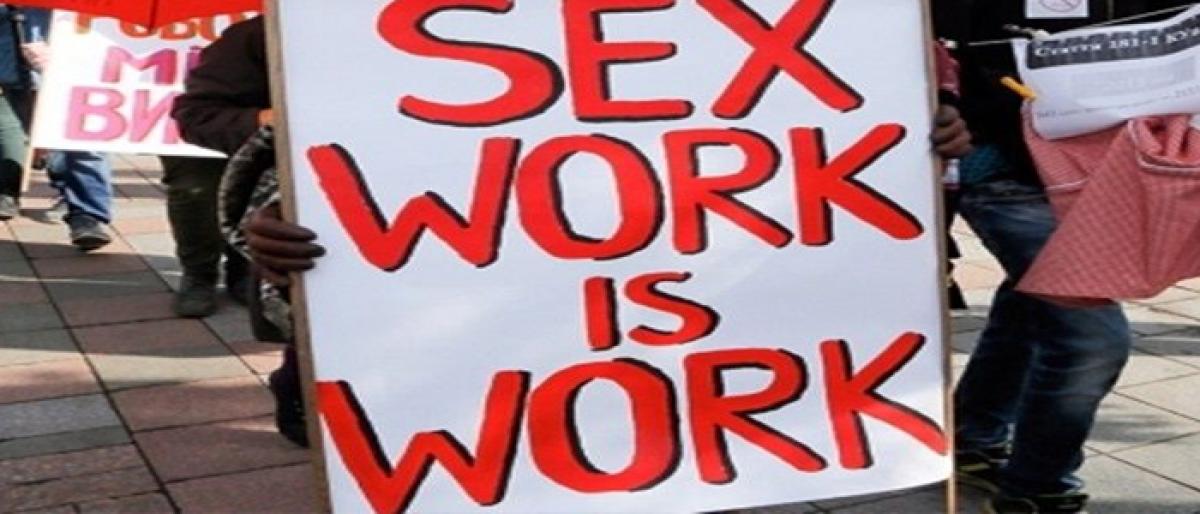Trafficking bill mum on consenting sex workers

Geeta name changed, a resident of Sangli village in Maharashtra, was 19 when she became a sex worker, not as a victim of trafficking but as an option to feed herself and support her family financially
New Delhi/Kolkata: Geeta (name changed), a resident of Sangli village in Maharashtra, was 19 when she became a sex worker, not as a victim of trafficking but as an option to feed herself and support her family financially.
Now 32 and a mother of 10-year-old son, Geeta is facing a new hurdle – that of forced rehabilitation by the government of sex workers. And she expressed her anxiety that if Parliament clears an anti-human trafficking bill pending before it, it will cause chaos in her life.
"I don't want to go to any rehab centre; I don't want to learn stitching work or making pickles. Nobody forced me to be a sex worker; it was my choice and I am earning well enough to survive with my son," Geeta told IANS. This is not just the voice of Geeta – many other sex workers too believe the anti-trafficking bill will create turmoil in their lives.
Kusum, 40, who only uses her first name, lives in one of the brothels on Delhi's GB Road. She said she is not ashamed of being known to the world as a sex worker and insisted on not changing her name. "I had chosen to go ahead as a sex worker, nobody pressurised me. This is my profession, just like other jobs. Had I wanted to move out of it, I could have done so a long time ago. Now, the government is pushing for rehab but they don't understand that sex workers are not perceived by the society with dignity," said Kusum, who is also President of the All India Network of Sex Workers (AINSW).
"Not all sex workers are victims of human trafficking and the government needs to understand the difference between the two. There are many like me who have chosen it as a source of income," she added. As the monsoon session began on July 18, the Trafficking of Persons (Prevention, Protection and Rehabilitation) Bill, 2018, was tabled in the Lok Sabha by Women and Child Development Minister Maneka Gandhi.
According to National Crime Records Bureau (NCRB) figures, around 8,100 cases of trafficking were recorded in India in 2016 and around 23,000 victims of trafficking were rescued the same year (61 per cent of these were children).
Trafficking, under the Section 370 of the Indian Penal Code (IPC), has been defined as "any act" of physical and sexual exploitation, slavery or practices similar to slavery and servitude.
Legal experts and social activists also expressed their worry that the bill might have a direct negative impact on the lives of many sex workers as it does not address the legal and real-time challenges in trafficking in persons. "The clauses of the bill do not directly point at sex workers; however, some of the clauses are linked to them," Samarjit Jana, Director, Sonagachi Research and Training Institute, Kolkata, told IANS.
According to the activists, the bill must clearly state that it does not include consenting adults and they should be enabled to continue with their chosen occupation. "Trafficking of persons into forced or coerced labour should not be equated with sex work undertaken by consenting adults. This conflation can lead to misuse and over-broad application of the provisions in this bill," Jana, who has for long been associated with the rights of sex-workers, stated.
Another issue that the experts are concerned about is that the government does not offer a proper rehabilitation programme. "What the government is offering as rehabilitation cannot be called a substantive package for surviving. In the name of rehabilitation, all they offer is stitching classes. How can a sex-worker, who is also a mother, earn enough through simply sewing work," asked Aarthi Pai, an activist and lawyer associated with the Bengaluru-based NGO Sangram.
"There is also the social-stigma factor which the government has been totally ignoring. Indian society will never accept an individual who has been a sex worker. Government needs to have a deeper insight into such factors," she noted.
Jana pointed out that certain guiding principles were shared with the government, asking the WCD Ministry to consider certain factors before drafting the bill – but these have been ignored. Earlier this month, around 4,300 sex workers had also written to Maneka Gandhi appealing to her to ensure that the new law does not lead to their incarceration. There has apparently been no action on this either.











